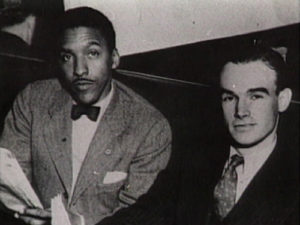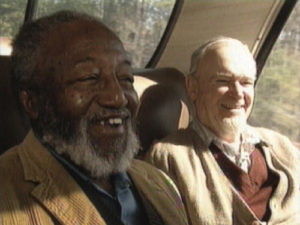Research: The Making of the Documentary
You Don’t Have to Ride JIM CROW!
Timeline of Events: Before Production
1860s: Civil War, end of slavery, Congress passes 14th Amendment guaranteeing blacks equal protection and, seemingly, public accommodation.
1870s-1890s: Southern states turn back freedoms guaranteed to blacks by the 14th Amendment. Supreme Court decides Hall v. DeCuir (1878), which holds that one state cannot enforce an integration law on another state due to the Interstate Commerce Clause, and Plessy v. Ferguson (1896), which allows segregation so long as facilities are “separate but equal,” which in fact they were not.
April 28, 1941: Arthur Mitchell, a black congressman from Chicago, wins Supreme Court decision outlawing segregation in first class travel, establishing that “separate but equal” accommodations must indeed be equal.
April 1942: Congress of Racial Equality (CORE) formed in Chicago by Jim Farmer, George Houser and Berniece Fisher. Houser and Farmer also work as race relations secretaries for the Fellowship of Reconciliation.
July 17, 1944: Irene Morgan arrested in Gloucester, Va., for refusing to give up her seat on an interstate bus headed to Maryland. NAACP lawyers Thurgood Marshall and Spottswood Robinson take her case.
June 3, 1946: Marshall and Robinson win Morgan v. Virginia in the Supreme Court, basing their argument not on the 14th Amendment, but Hall v. DeCuir. Their logic was if it is an “undue burden on commerce” for one state to enforce an integration law on another, so too would it be for a state to impose its segregation laws on interstate passengers.
Fall 1946: With few Southern states enforcing the Morgan decision, George Houser, Bayard Rustin and other leaders of the Congress of Racial Equality devise the idea of an interstate “Journey of Reconciliation” to the Upper South, in which whites and blacks would travel together, purposely violating local Jim Crow laws.

Bayard Rustin and George Houser
April 9-23, 1947: Rustin and Houser lead eight white men and eight black men in the Journey of Reconciliation through Virginia, North Carolina, Tennessee and Kentucky. A second trip is suggested for an interracial group of women, but does not materialize.
1949: Rustin, Igal Roodenko and Joe Felmet sentenced to 30 days on a chain gang for violating North Carolina Jim Crow laws on the Journey.
May 17, 1954: Supreme Court decides Brown v. Board of Education, overturning Plessy v. Ferguson and holding segregation unconstitutional.
August 1955: 14-year-old Emmett Till is lynched in Money, Mississippi.
December 1955: Rosa Parks refuses to give up her seat to a white man on a city bus in Montgomery, Ala., sparking a year-long bus boycott there led by the Rev. Martin Luther King. Bayard Rustin serves as an advisor to the boycotters.
May 1961: Under Jim Farmer, CORE launches a second Journey of Reconciliation, this time called a “Freedom Ride,” and this time targeting segregated bus stations as well as the buses themselves. The travelers, which include women and men, head to the Deep South, where they are brutally beaten. Jim Peck is the only veteran of the 1947 journey to participate.
August 28, 1963: March on Washington held, in which Dr. King gives his “I Had a Dream” speech. The event – then the largest mass protest to date in American history – is largely organized by Rustin.
November 22, 1963: President John F. Kennedy is assassinated in Dallas, Texas.
1964: Congress passes Civil Rights Act, permanently guaranteeing equal public accommodations.
1965: Congress passes Voting Rights Act.
Timeline of Events: The Making of “You Don’t Have to Ride Jim Crow!”
1987: After nine years as a newspaper and magazine journalist, Robin Washington takes a broadcast fellowship at WGBH television and radio in Boston.
1989: Washington produces the documentary “Vermont: The Whitest State in the Union” for WGBH, earning a New England Emmy Award.
1992: Washington serves as communications director for the Fellowship of Reconciliation in Nyack, N.Y. In the basement of the organization’s headquarters, he discovers extensive artifacts of the early days of the pacifist and civil rights movements, including meeting minutes on the formation of CORE and the planning of the Journey of Reconciliation.
February 1993: Washington leaves the FOR and begins work on a documentary of the journey. Of the 16 participants, 10 are located but three — Jim Peck, Homer Jack and Worth Randle — die shortly before production begins.
August 1993: Six journey participants (Nathan Wright, Bill Worthy, Ernie Bromley, Wally Nelson, Conrad Lynn and Joe Felmet) gather in Washington, D.C., for the 35th Anniversary March on Washington. They also meet Irene Morgan (now Kirkaldy) for the first time and travel to Virginia to visit Jim Farmer, who could not make the first trip. The group poses in front of Spottswood Robinson’s Richmond law office, where the only photograph of the journey was taken nearly 50 years before.

Wally Nelson and George Houser sit side by side on a 1994 reunion bus trip.
March 1994: Second reunion trip (Nathan Wright, Bill Worthy, Ernie Bromley, Wally Nelson, George Houser and Joe Felmet) through North Carolina, including the site of the Chapel Hill bus station where the group was attacked in 1947. The group also meet many who helped them along the way on the historic trip.
Fall 1994: Joe Felmet dies. Retired United States Appeals Court Judge A. Leon Higginbotham agrees to narate the program.
February 1995: Program premieres on New Hampshire Public Television.
1995: Program makes national debut. The Rev. Wyatt T. Walker, a former aide to Dr. King, honors riders and Washington with Trumpeters of Freedom Award.
1996: Program wins Silver Gavel Award from American Bar Association.
1997: Conrad Lynn and Ernest Bromley die.
1999: Judge Higginbotham dies.
August 2000: Irene Morgan Kirkaldy is honored by Gloucester, Va., as the kickoff to that city’s 350th Anniversary celebration.
December 2000: President Bill Clinton awards Kirkaldy the Presidential Citizenship Medal.
April 2002: Boston’s Community Change, Inc., holds plenary and screening of the program and presents the Drylongso Awards to the riders, the late Judge Higginbotham and Washington.
May 2002: Wally Nelson dies. Hundreds gather in Deerfield, Mass., for his memorial.
Read next: The Producer

 WordPress
WordPress